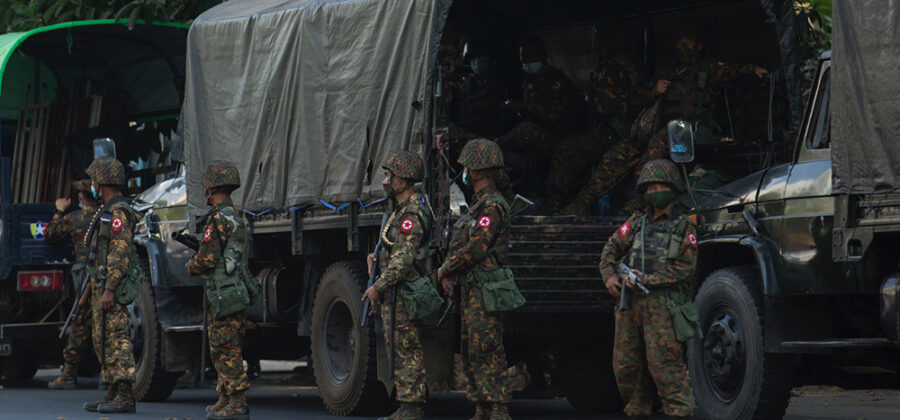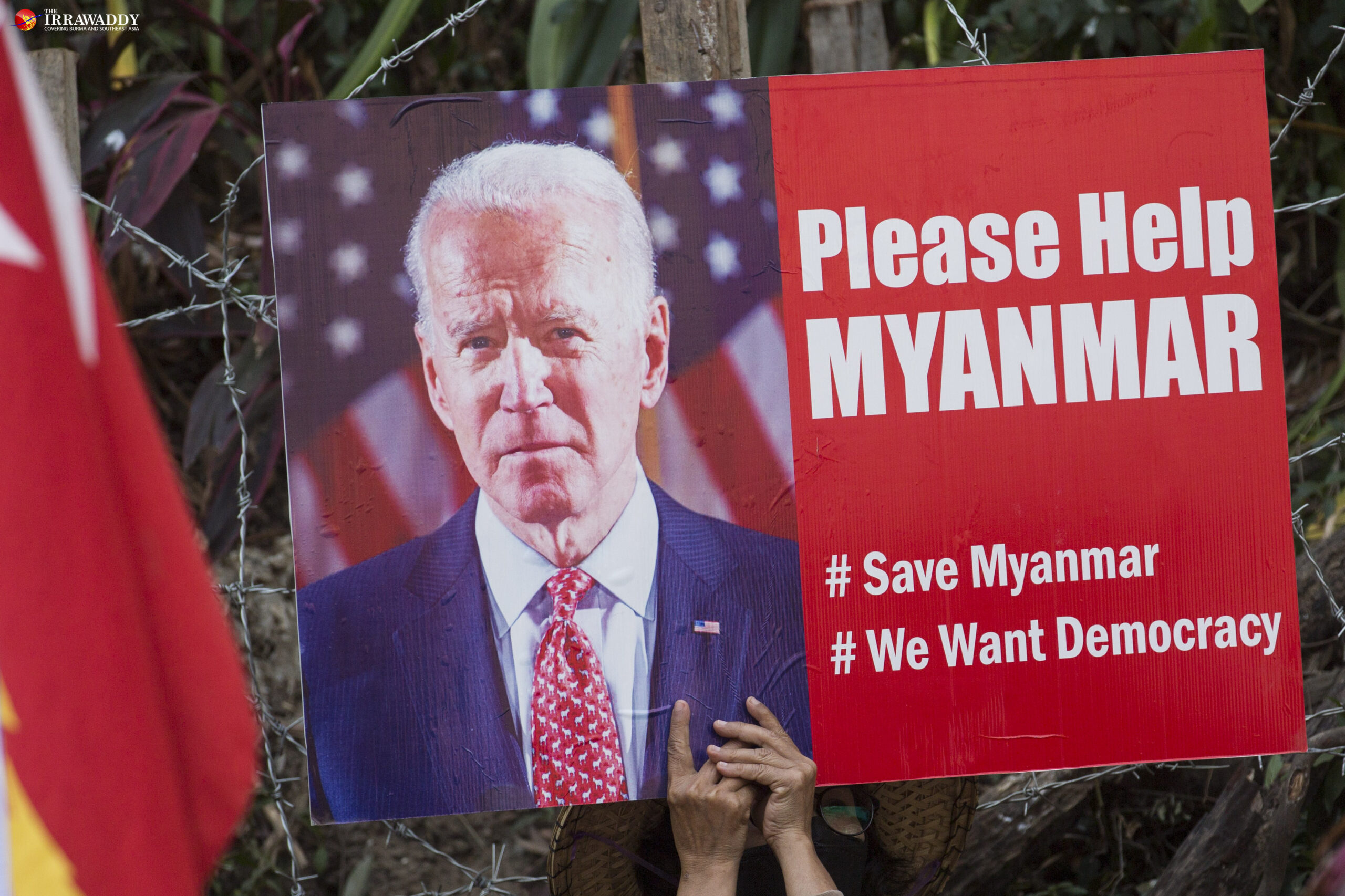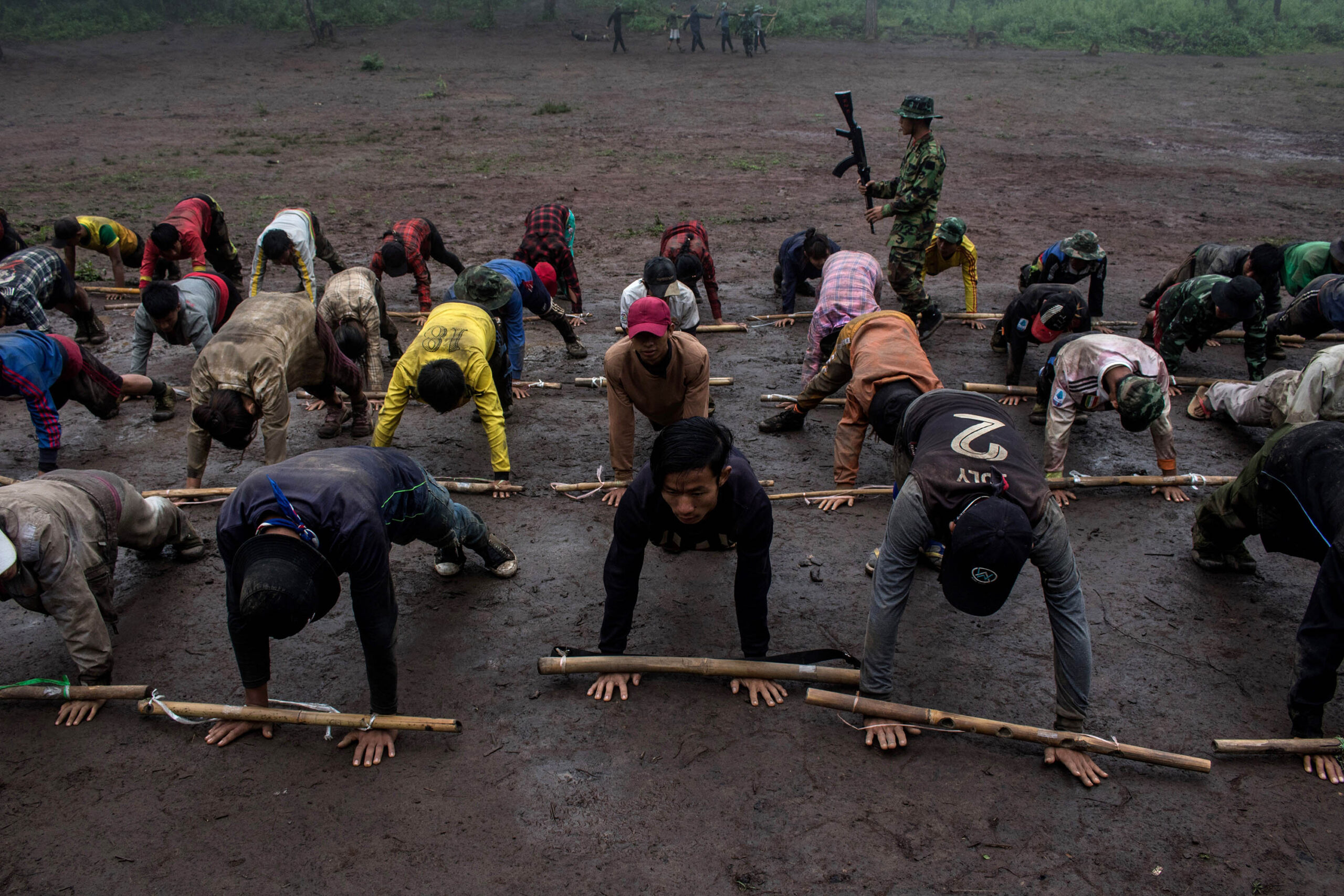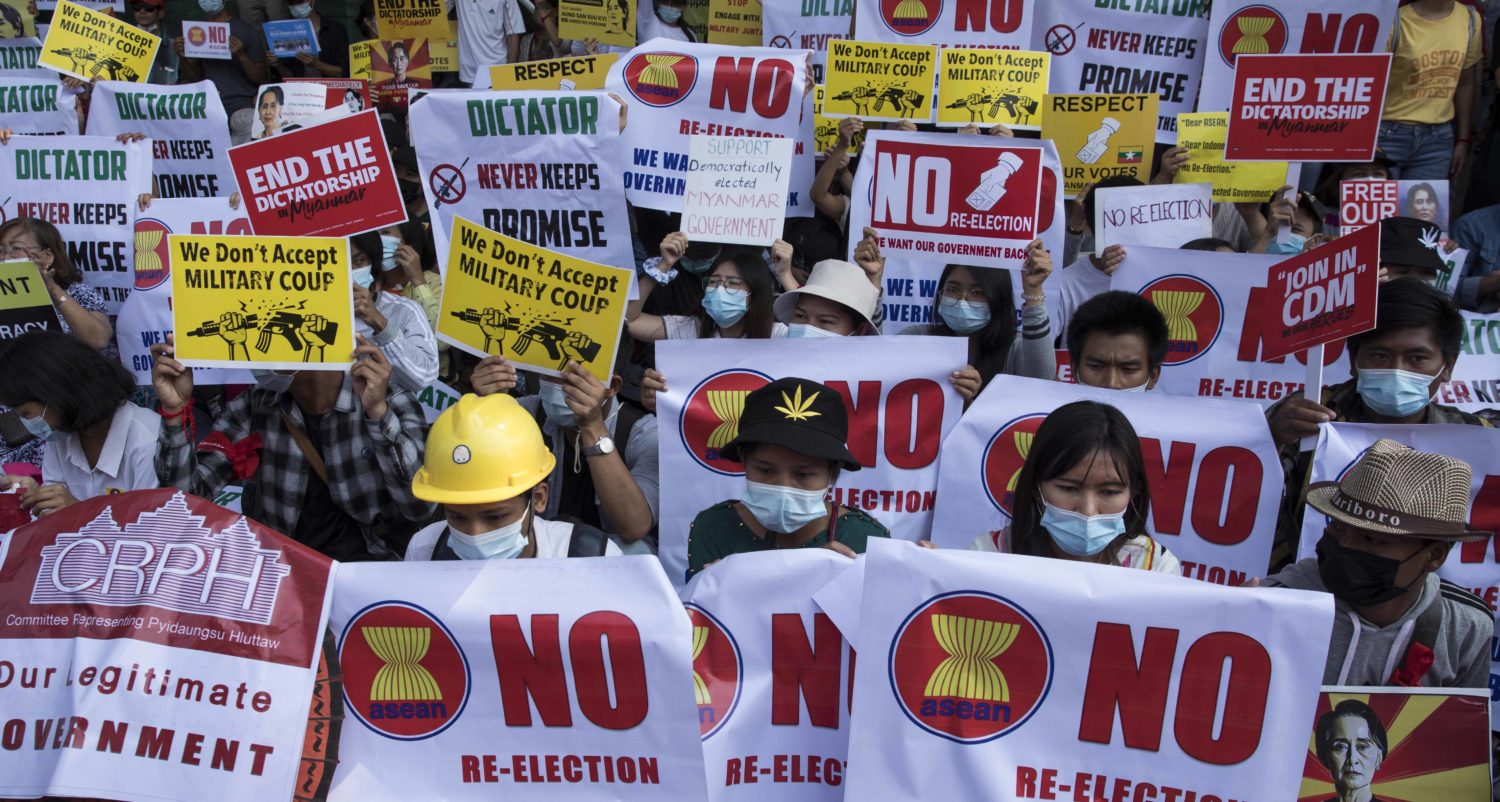The world sees Myanmar’s generals and their military as “a bunch of thugs”. The problem, however, is that it doesn’t treat them as thugs.
In a recent interview with The Irrawaddy, US State Department Counselor Derek Chollet called the ruling military “a bunch of thugs”.
No doubt the rest of the world—especially Western or democratic countries—would agree with the term, as they have seen how brutal and violent the regime has been against its people since its coup on Feb. 1, 2021.
The US and the rest of the world, however, don’t really treat the generals as “thugs”. Instead, individual countries and the global community as a whole have been treating them as naughty school boys to be disciplined.
Their biggest stick has been to impose economic sanctions against the military and its leaders, to condemn the generals and issue statements expressing concern at the generals’ gross human rights violations. None, however, have worked to make the thuggish generals stop their atrocities against the people.

Over the past one-and-a-half years since the coup, there has been nothing but tragic news from Myanmar. Every day the ruthless regime kills, arrests and tortures civilians, and torches houses and destroys villages and towns. The entire population has been brutalized day and night.
So far, the regime has killed more than 2,000 civilians, arrested more than 14,000, and destroyed 20,000 houses, which has forced more than 750,000 people to flee their homes, according to the United Nations. On the ground, the actual death toll might be higher and the destruction greater than these numbers.
Every day is a bloody one in Myanmar.
The meager punishments that have been imposed by the US and some Western countries since the coup haven’t been able to deter the regime from committing such atrocities, which constitute crimes against humanity and war crimes.
And what happens?
The world keeps watching. The regime keeps slaughtering.
The generals are doing nothing less than waging a war against their own population of 55 million people. Because they want to consolidate their power after illegitimately overthrowing the elected civilian government. Because they want to erase the overwhelming result of the election in 2020, in which the National League for Democracy (NLD) led by Daw Aung San Suu Kyi won a landslide victory.
Mainly, the junta’s coup and the resulting war have been waged to kill democracy and its principles and norms, and eradicate all the democratic forces that have ceaselessly struggled to implement the federal democracy the people seek. Because they want to monopolize the entire economy and all industries for themselves. Because they—like all the other dictators in the world—want to run their home country as their private fiefdom.

It’s a continuation of the decades-long war against the people and their aspirations that Myanmar’s generals began in 1962.
But this time the people of Myanmar, whose aspirations have been consistently thwarted by the generals over the past 50 years—in the coups of 1962, 1988 and 2021—have mounted an unprecedented resistance against the coup makers.
Given their previous experiences of life under the military, they have learned their lesson; the people are left with no choice but to fight back. Consequently, many young people have taken up weapons to form their own army.
When it comes to support from the international community led by the US, the people of Myanmar also know from experience—especially after their nationwide uprising in 1988—that support for their struggle for democracy is unlikely to go beyond moral support. International backing for the democracy movement and foreign countries’ efforts to punish successive oppressive regimes have never been effective in stopping the regimes’ atrocities or the generals’ cruelty.
This has always been the case.
As for the generals, they simply grow more brutal every day, waging an unjust war against their own people, using ever more inhumane and vengeful means.
In early June, the regime ordered the executions of anti-coup activists, including two respected prominent pro-democracy activists—Ko Phyo Zeya Thaw, a lawmaker of the ousted NLD, and veteran democracy activist Ko Kyaw Min Yu, known as Ko Jimmy—for their anti-coup resistance activities. The regime’s spokesperson has repeatedly confirmed that the activists will be executed, insisting the sentence is warranted.
It has come as shocking news for the people of Myanmar. Certainly, the sentences must be a source of constant anguish both for the activists on death row and for their relatives outside.
The people feel angry and helpless.
In late June, the ruling generals sent detained elected leader Daw Aung San Suu Kyi, who had been under house arrest since the coup, to a prison where she is now kept in solitary confinement.
It’s tormenting news for the people of Myanmar, most of whom voted for her as their leader in the last election in 2020. Many believe that it is a form of torture to send her to prison, where the 77-year-old will suffer under harsh conditions.

This too leaves the people feeling angry and even more helpless.
What has the world done?
As ever, it has “strongly” condemned the regime for its horrendous actions.
US Department of State spokesperson Ned Price said: “The United States strongly condemns the Burmese military regime’s reported plans to execute pro-democracy and opposition leaders, exemplifying the regime’s disregard for human rights and the rule of law. We urge the release of all unjustly detained.”
Four days after the detained leader was transferred to prison, Counselor Chollet said on his Twitter account: “The US strongly denounces the military regime’s use of solitary confinement for Daw Aung San Suu Kyi.”
Globally, the US has always been the strongest supporter of Myanmar’s pro-democracy movement. Many people in Myanmar feel the US has always been a friend in need. But its vocal “condemnations”, not backed up by effective action, have been met by frustration and even mockery from the Myanmar people.
In dealing with the previous military regime, which ruled the country from 1988 to the 2010s, the US seemed to show more initiative than now.
This time, the Myanmar people are suffering more than ever. Their society has been shattered and their country destroyed. The crisis continues to escalate and the people of Myanmar feel more helpless each day, waking up each morning to another tragic day.
But the US and the rest of the international community have applied nothing more than a “talk the talk” policy.
Given the experiences and lessons of the past, sanctions are of limited effectiveness to press the thugs in Myanmar to end their violence and return to the path of democracy, as the world demands.
The thugs don’t care. The world and the US know it. But they lack initiative and effort.
Since the coup, the US has shown neither initiative nor leadership, but simply backed ASEAN, which is traditionally toothless, as it tries to coax better behavior from one of its members. Myanmar used to be a hot potato for the grouping and is now living up to its bad reputation. ASEAN failed in its attempt to deal with Myanmar’s previous military regime. This time, its Five-Point Consensus has yielded nothing. We can predict this will not change; the regime has failed to live up to its commitments, refusing to allow engagement with key stakeholders, including elected leaders, the shadow National Unity Government (NUG) and other democratic and ethnic forces.
The US and the world have knowingly chosen this strategy of letting ASEAN take the lead. Which means they lack the interest to lead or come up with more effective policies other than talking.
They lack interest, which leads to ineffective policies, initiative and support for the Myanmar people, though the US always says that it stands with the people.
After having heard it repeatedly, Myanmar people feel these are just words and understand that neither the world nor the US can help stop their livelihoods from being destroyed or support their revolution to topple the regime.

Last week, Tom Andrews, special rapporteur on human rights in Myanmar to the Human Rights Council in Geneva, slammed the international community for its inability to tackle alleged human rights abuses and possible war crimes in Myanmar.
“The devastating and deteriorating conditions in Myanmar should lead to only one conclusion: the international community’s current approach to the crisis in Myanmar is not working,” he said. “Words of support for human rights in Myanmar, while welcome, should be matched by decisive action.”
He added: “The failure to take strong, meaningful action will be a death sentence for untold numbers of people.”
The people of Myanmar have no choice but to stand on their own two feet.
That’s why many people in Myanmar, though they are not rich, have donated to the NUG to buy weapons to fight the junta’s troops across the country. The NUG recently said it has received more than US$40 million from the people and spent 95 percent of it on its military budget to provide weapons to its army, a loosely organized network of groups collectively called the People Defense Force, and to those ethnic armed organizations that have joined the resistance against the regime.
The amount the NUG has received so far is far less than the total cost of well below $1 billion—a small fraction of the military aid the Biden administration is currently supplying to Ukraine—which some assessments estimate the NUG needs to spend on arms for its resistance forces in their fight against the regime.
The Myanmar people do not, even for one day, want to be ruled by a bunch of thugs who are abusive, arbitrary, brutal and corrupt. For that, they deserve the world’s full support.
If—and it’s a big IF—the US and the rest of the world want to be responsible, they mustn’t let the resistance fighters be killed, and should do something meaningful to enable them to fight to end the military dictatorship and take Myanmar’s future back.
The world should take responsibility and help the Myanmar people treat the thugs as thugs.
Naing Khit is a commentator on political affairs.
You may also like these stories:
Myanmar Junta Airstrikes Continue in Kayah State
Hell Hounds Are Loose in Myanmar; Who Can Stop Them?
















